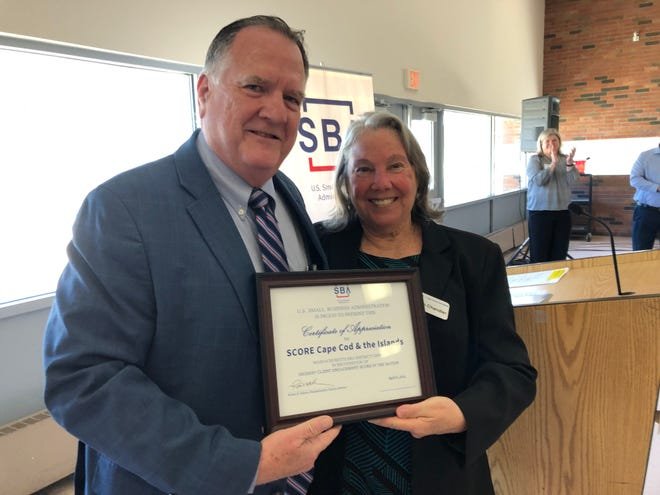BARNSTABLE — The Small Business Administration played matchmaker at the high school Wednesday. There, local financiers were on hand to talk with small business owners about how to use capital to start, grow and expand.
The event featured nine financial institutions and 15 organizations that can provide resources to support small business financing. About 200 small businesses registered for the event, said Robert Nelson, SBA’s Massachusetts district director.
“Massachusetts is experiencing a small business boom,” Nelson said.
He said that since the Biden-Harris administration took office, 17 million small businesses have been started across the United States, setting an all-time record. The average number of small and medium-sized enterprises established each month nationwide is 440,000. The SBA is a critical partner in that growth. Government agencies offer a variety of loans ranging from $500 to $5.5 million, each with different permitted uses, borrowing limits, repayment terms, and approval requirements.

Cape Cod will receive $35 million in Small Business Administration loans in 2023
Last year, the SBA processed $27.5 billion in 7A loans, which are guaranteed loans to lenders, and $6.4 billion in 504 loans, Nelson said. 504 loans are typically for owner-occupied real estate loans and financing the purchase of major equipment. SBA guarantees make it easier for lenders to approve your loan.
In Massachusetts, the SBA provided $818 million in capital assistance last year through the 504, 7A, and microloan programs. More than 100 loans totaling $35 million were made in Barnstable County.
That included loans to home health care, food and cleaning services, restaurants, interior design, electrical and finishing carpentry, home goods stores, toy stores and game stores, Nelson said. Loans were made to startups, established businesses, and businesses owned by women, veterans, and people of color.
What financial institutions look for in small business owners seeking financing:
Do your due diligence before looking for a lender. Find a lender you can trust and work with. Don’t be discouraged. Prepare your business plan, elevator speech, and business and industry understanding.
How much money do you need for what? We will provide you with a quote for what you need. Show how revenue is generated and who the key vendors are. Provide financial forecasts.
Lenders want to know how much capital the owner has put into the project.
Trying to take out a loan even though there are negative factors in the background
Eric Bancroft, vice president and SBA specialist at TD Bank, says, “Put the skunk aside. Disclose the negative aspects of your business. Have you filed for bankruptcy? How much?” he said.
Personal information considered includes credit issues, personal tax returns and financial statements, business tax returns, other assets, and other sources of income, including spousal and passive income.
Respond promptly to lender questions during the underwriting process. We provide a list of professional advisors (paid and free) to help your business. Schedule an assessment or environmental review as needed.
Do you have security from a spouse, partner, or other asset or source of income? Do you have credit issues? Lenders will look at your personal tax returns and personal financial statements, your business tax returns, and your skills as they align with your business.
Cooperation with local governments
All cities and towns must abide by the general laws of the Commonwealth of Massachusetts. Understanding one town’s process can help other towns bid. Consider bidding on smaller jobs and building relationships with larger contractors. Job opportunities may present themselves, such as carpet cleaning or school janitor work. Use these as stepping stones to other opportunities.
Collaboration with Massachusetts
Massachusetts must meet standards for conducting minority-owned businesses. Companies must be certified for quality. Certification increases your chances of partnering with leading vendors committed to diversity.
The state’s Division of Operations Services offers a free three-hour training course on getting certified.
The Office of the Inspector General offers a two-day course on state procurement procedures and requirements.
The state uses COMMBUYS for purchases. Find out how countries buy what you sell.
Dennis Coffey writes about business, tourism and issues affecting Cape residents and visitors. To contact her,dcoffey@capecodonline.com .
Thank you to our subscribers who make this coverage possible. If you’re not a subscriber, please consider supporting quality local journalism.Cape Cod Times subscription.

